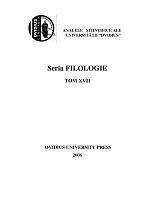“Metamorphoses” of Proteus in Pound’s Cantos and Joyce’s Ulysses
“Metamorphoses” of Proteus in Pound’s Cantos and Joyce’s Ulysses
Author(s): Adina CiugureanuSubject(s): Literary Texts
Published by: Ovidius University Press
Keywords: myth of Proteus; Homer’s The Odyssey; revisit; cultural perspective; strategies of writing.
Summary/Abstract: This article discusses the way in which Pound and Joyce revisit the myth of Proteus (The Odyssey, Book 4) and use it in ‘Canto II’ and Ulysses (Episode III), respectively. Starting from the very essence of the myth (the sea god’s magic ability to turn into various creatures and nature elements), Pound and Joyce manage to transform the myth itself into a pattern to suit their modernist writing strategies. Thus, the myth becomes the background for metaphorical metamorphoses. Both Pound and Joyce use elements of the myth (the sea shore, the seal image, the daughter of Ocean, the allusion to Helen of Troy and the war, the ship motif, the feeling of imprisonment and insecurity) not only to re-tell the myth from a different cultural perspective, but also to prove that the myth itself may be metamorphosed into strategies of writing. By juxtaposing key-words from Homer’s tale, Pound manages to rewrite it from a Cubist perspective, while Joyce creates brilliant correspondences between the sea-god’s changing shape and form and Stephen Dedalus’s tumultuous changing of thoughts. In this way, both modernist writers reveal the universality of the Greek myth on the one hand, and its inexhaustible resources of novelty on the other.
Journal: Analele Universităţii Ovidius din Constanţa. Seria Filologie
- Issue Year: 2006
- Issue No: 17
- Page Range: 95-107
- Page Count: 13
- Language: English

